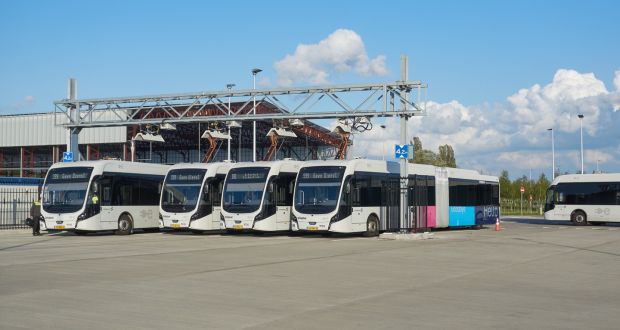In a major push towards electric mobility the Centre has sanctioned 670 electric buses in the states of Maharashtra, Goa, Gujarat and Chandigarh under Phase-II of FAME India Scheme.
It has also sanctioned 241 charging stations in Madhya Pradesh, Tamil Nadu, Kerala, Gujarat and Port Blair.
The move will reduce dependence on fossil fuel and address issues of vehicular emissions.
The Department of Heavy Industries (DHI) under the Ministry of Heavy Industries and Public Enterprises, is administering the Faster Adoption and Manufacturing of Hybrid & Electric Vehicles in India (FAME India) Scheme since April 2015 to promote adoption of electric/hybrid vehicles (EVs) in India.
The Centre has approved 100 e-buses for the Kadamba Transport Corporation in Goa; 100 e-buses for MSRTC; 40 for BEST-Mumbai and 100 e-buses for the Navi Mumbai Municipal Transport in Maharashtra; 100 e-buses for Rajkot Rajpath and 150 e-buses for the Surat Municipal Corporation in Gujarat; and 80 e-buses for the Chandigarh Transport Undertaking.
The charging stations sanctioned are 76 for Atal Indore City Transport Services (Indore); 25 for TNSRTC Kumbakonam (Tiruchirappalli); 10 for NTPC (Port Blair); 25 in Kollam; 27 in Thiruvananthapuram; 28 in Malappuram for KSEB; and 50 for the Surat Municipal Corporation.
In Phase-I of the scheme up to 31 March 2019, about 2,80,987 hybrid and electric vehicles were supported by way of demand incentive, amounting to about Rs 359 crore.
Further, DHI sanctioned 425 electric and hybrid buses to various cities in the country with total cost of about Rs 280 crore. The Department of Heavy Industry had also sanctioned 520 charging stations for around Rs 43 crore in cities like Bengaluru, Chandigarh, Jaipur and NCR of Delhi under Phase-I of FAME-India Scheme.
At present, Phase-II of FAME India Scheme is being implemented for a period of three years w.e.f. 01 April 2019 with a total budgetary support of Rs 10,000 crore.
This phase focuses on supporting electrification of public & shared transportation and aims to support, through subsidies, approximately 7,000 e-buses, 5 lakh e-three wheelers, 55000 e-four wheeler passenger cars and 10 lakh e-two wheelers.











